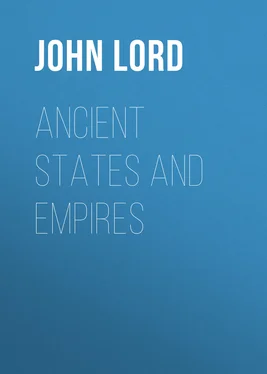John Lord - Ancient States and Empires
Здесь есть возможность читать онлайн «John Lord - Ancient States and Empires» — ознакомительный отрывок электронной книги совершенно бесплатно, а после прочтения отрывка купить полную версию. В некоторых случаях можно слушать аудио, скачать через торрент в формате fb2 и присутствует краткое содержание. Жанр: foreign_prose, История, foreign_edu, foreign_antique, на английском языке. Описание произведения, (предисловие) а так же отзывы посетителей доступны на портале библиотеки ЛибКат.
- Название:Ancient States and Empires
- Автор:
- Жанр:
- Год:неизвестен
- ISBN:нет данных
- Рейтинг книги:4 / 5. Голосов: 1
-
Избранное:Добавить в избранное
- Отзывы:
-
Ваша оценка:
- 80
- 1
- 2
- 3
- 4
- 5
Ancient States and Empires: краткое содержание, описание и аннотация
Предлагаем к чтению аннотацию, описание, краткое содержание или предисловие (зависит от того, что написал сам автор книги «Ancient States and Empires»). Если вы не нашли необходимую информацию о книге — напишите в комментариях, мы постараемся отыскать её.
Ancient States and Empires — читать онлайн ознакомительный отрывок
Ниже представлен текст книги, разбитый по страницам. Система сохранения места последней прочитанной страницы, позволяет с удобством читать онлайн бесплатно книгу «Ancient States and Empires», без необходимости каждый раз заново искать на чём Вы остановились. Поставьте закладку, и сможете в любой момент перейти на страницу, на которой закончили чтение.
Интервал:
Закладка:
The Mosaic code was framed in the first year after the exodus, while the Israelites were encamped near Sinai. When the Tabernacle was erected, the camp was broken up, and the wandering in the desert recommenced. This was continued for forty years—not as a punishment, but as a discipline, to enable the Jews to become indoctrinated into the principles of their constitution, and to gain strength and organization, so as more successfully to contend with the people they were commanded to expel from Canaan. In this wilderness they had few enemies, and some friends, and these were wandering Arab tribes.
The wanderings of the Israelites.
We can not point out all the details of the wanderings under the leadership of Moses, guided by the pillar of fire and the cloud. After forty years, they reached the broad valley which runs from the eastern gulf of the Red Sea, along the foot of Mount Seir, to the valley of the Dead Sea. Diverted from a direct entrance into Canaan by hostile Edomites, they marched to the hilly country to the east of Jordan, inhabited by the Amorites. In a conflict with this nation, they gained possession of their whole territory, from Mount Hermon to the river Anton, which runs into the Dead Sea. The hills south of this river were inhabited by pastoral Moabites—descendants of Lot, and beyond them to the Great Desert were the Ammonites, also descendants of Lot. That nation formed an alliance with the Midianites, hoping to expel the invaders then encamped on the plains of Moab. Here Moses delivered his farewell instructions, appointed his successor, and passed away on Mount Pisgah, from which he could see the promised land, but which he was not permitted to conquer. That task was reserved for Joshua, but the complete conquest of the Canaanites did not take place till the reign of David.
CHAPTER VI.
THE CONQUEST OF CANAAN TO THE ESTABLISHMENT OF THE KINGDOM OF DAVID
The only survivors of the generation that had escaped from Egypt were Caleb and Joshua. All the rest had offended God by murmurings, rebellion, idolatries, and sundry offenses, by which they were not deemed worthy to enter the promised land. Even Moses and Aaron had sinned against the Lord.
Non-intercourse of the Jews with other nations. Death of Moses.
So after forty years' wanderings, and the children of Israel were encamped on the plains of Moab, Moses finally addressed them, forbidding all intercourse with Jews with other nations, enjoining obedience to God, requiring the utter extirpation of idolatry, and rehearsing in general, the laws which he had previously given them, and which form the substance of the Jewish code, all of which he also committed to writing, and then ascended to the top of Pisgah, over against Jericho, from which he surveyed, all the land of Judah and Napthali, and Manasseh and Gilead unto Dan—the greater part of the land promised unto Abraham. He then died, at the age of 120, B.C. 1451 and no man knew the place of his burial.
Joshua.
The Lord then encouraged Joshua his successor, and the conquest of the country began—by the passage over the Jordan and the fall of Jericho. The manna, with which the Israelites for forty years had been miraculously fed, now was no longer to be had, and supplies of food were obtained from the enemy's country. None of the inhabitants of Jericho were spared except Rahab the harlot, and her father's household, in reward for her secretion of the spy which Joshua had sent into the city. At the city of Ai, the three thousand men sent to take it were repulsed, in punishment for the sin of Achan, who had taken at the spoil of Jericho, a Babylonian garment and three hundred sheckels of silver and a wedge of gold. After he had expiated this crime, the city of Ai was taken, and all its inhabitants were put to death. The spoil of the city was reserved for the nation.
His victories.
The fall of these two cities alarmed the Hamite nations of Palestine west of the Jordan, and five kings of the Amorites entered into a confederation to resist the invaders. The Gibeonites made a separate peace with the Israelites. Their lives were consequently spared, but they were made slaves forever. Thus was fulfilled the prophecy that Canaan should serve Shem.
Meantime the confederate kings—more incensed with the Gibeonites than with the Israelites, since they were traitors to the general cause, marched against Gibeon, one of the strongest cities of the land. It invoked the aid of Joshua, who came up from Gilgal, and a great battle was fought, and resulted in the total discomfiture of the five Canaanite kings. The cities of Makkedah, Libnah, Gizu, Eglon, Hebron, successively fell into the hands of Joshua, as the result of their victory.
Combination of the Canaanites against Joshua.
The following year a confederation of the Northern kings, a vast host with horses and chariots, was arrayed against the Israelites; but the forces of the Canaanites were defeated at the “Waters of Merom,” a small lake, formerly the Upper Jordan. This victory was followed by the fall of Hazor, and the conquest of the whole land from Mount Halak to the Valley of Lebanon. Thirty-one kings were smitten “in the mountains, in the plains, in the wilderness, in the south country: the Hittites, the Amorites, the Canaanites, the Perizites, the Hivites, and the Jebusites.” There only remained the Philistines, whose power was formidable. The conquered country was divided among the different tribes, half of which were settled on the west of Jordan. The tabernacle was now removed to Shiloh, in the central hill country between Jordan and the Mediterranean, which had been assigned, to the tribe of Ephraim. Jacob had prophetically declared the ultimate settlements of the twelve tribes in the various sections of the conquered country. The pre-eminence was given to Judah, whose territory was the most considerable, including Jerusalem, the future capital, then in the hands of the Jebusites. The hilly country first fell into the hands of the invaders, while the low lands were held tenaciously by the old inhabitants where their cavalry and war chariots were of most avail.
Conquest of Canaan.
The Israelites then entered, by conquest, into a fruitful land, well irrigated, whose material civilization was already established, with orchards and vineyards, and a cultivated face of nature, with strong cities and fortifications.
Death of Joshua.
Joshua, the great captain of the nation, died about the year 1426 B.C., and Shechem, the old abode of Abraham and Jacob, remained the chief city until the fall of Jerusalem. Here the bones of Joseph were deposited, with those of his ancestors.
The Judges.
The nation was ruled by Judges from the death of Joshua for about 330 years—a period of turbulence and of conquest. The theocracy was in full force, administered by the high priests and the council of elders. The people, however, were not perfectly cured of the sin of idolatry, and paid religious veneration to the gods of Phœnicia and Moab. The tribes enjoyed a virtual independence, and central authority was weak. In consequence, there were frequent dissensions and jealousies and encroachments.
Their wars.
The most powerful external enemies of this period were the kings of Mesopotamia, of Moab, and of Hazor, the Midianites, the Amalekites, the Ammonites, and the Philistines. The great heroes of the Israelites in their contests with these people were Othnie, Ehud, Barak, Gideon, Jepthna, and Samson. After the victories of Gideon over the Midianites, and of Jepthna over the Ammonites, the northern and eastern tribes enjoyed comparative repose, and when tranquillity was restored Eli seems to have exercised the office of high priest with extraordinary dignity, but his sons were a disgrace and scandal, whose profligacy led the way to the temporary subjection of the Israelites for forty years to the Philistines, who obtained possession of the sacred ark.
Читать дальшеИнтервал:
Закладка:
Похожие книги на «Ancient States and Empires»
Представляем Вашему вниманию похожие книги на «Ancient States and Empires» списком для выбора. Мы отобрали схожую по названию и смыслу литературу в надежде предоставить читателям больше вариантов отыскать новые, интересные, ещё непрочитанные произведения.
Обсуждение, отзывы о книге «Ancient States and Empires» и просто собственные мнения читателей. Оставьте ваши комментарии, напишите, что Вы думаете о произведении, его смысле или главных героях. Укажите что конкретно понравилось, а что нет, и почему Вы так считаете.







